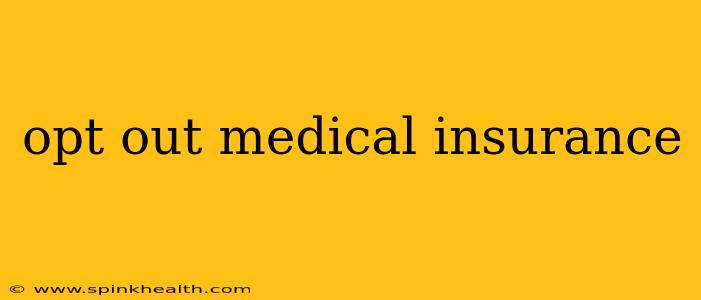Navigating the world of health insurance can feel like traversing a dense jungle. Terms like "deductibles," "copays," and "premiums" can be confusing, and the decision of whether or not to opt out of medical insurance is a significant one, fraught with potential consequences. This guide will illuminate the path, helping you understand the implications and empowering you to make an informed choice.
Imagine this: Sarah, a young, healthy freelance graphic designer, is facing a tough decision. She's been paying monthly premiums for health insurance for years, but the cost is starting to pinch her budget. She’s considering opting out, believing she’s healthy enough to handle any unforeseen medical expenses. Her story is not uncommon. Many people, especially younger, healthier individuals, find themselves questioning the value of maintaining health insurance coverage. But is opting out truly the right choice for everyone? Let’s delve deeper.
What Does Opting Out of Medical Insurance Mean?
Opting out of medical insurance simply means choosing not to enroll in or maintain a health insurance plan. This means you won't have the financial protection offered by a health insurance policy to cover medical expenses. This isn't a decision to be taken lightly.
What are the Risks of Opting Out of Medical Insurance?
This is where the "what ifs" come into play. The biggest risk is the potential for catastrophic medical expenses. Even a seemingly minor illness or accident can quickly escalate into a financially crippling situation without insurance.
What happens if I get seriously ill or injured without health insurance?
This is the core question many people wrestle with. A serious illness or injury without insurance can lead to overwhelming medical bills. Surgery, hospitalization, long-term care—these are all incredibly expensive, and even seemingly minor treatments can accumulate to substantial sums. You might face bankruptcy or spend years paying off medical debt.
Can I still access medical care without insurance?
Yes, you can still receive medical care without insurance, but it will likely be significantly more expensive. You'll be responsible for paying the full cost of your treatment upfront. Some hospitals and clinics offer financial assistance programs, but these are often limited and may not cover all expenses.
What about preventative care?
Preventative care, such as annual checkups and screenings, is crucial for maintaining good health. Without insurance, these visits will come out of your pocket, potentially discouraging regular checkups, which could lead to more serious and costly health problems down the line.
Are there any situations where opting out might be a reasonable option?
While generally risky, some situations might make opting out seem more plausible. A very young, healthy individual with a strong emergency fund and a stable income might feel comfortable taking this risk. However, a comprehensive analysis of personal finances and potential risks is crucial before making such a decision.
Alternatives to Traditional Health Insurance
Before completely opting out, consider exploring alternative options that offer some level of financial protection without the high premiums of comprehensive plans. These might include:
- High-deductible health plans (HDHPs): These plans have lower premiums but higher deductibles. They often come with a health savings account (HSA), which allows you to save pre-tax money for healthcare expenses.
- Short-term health insurance: These plans provide temporary coverage but usually don't cover pre-existing conditions and may have limitations on benefits.
Ultimately, the decision of whether or not to opt out of medical insurance is a deeply personal one. Carefully weigh your risks and potential costs against your financial situation and personal health status. Consult with a financial advisor and consider seeking advice from a healthcare professional to gain a clearer understanding of the potential implications of your decision. Remember, Sarah's story illustrates the importance of careful consideration; make the choice that's right for you, but do so with your eyes wide open.

